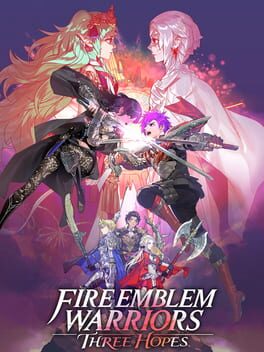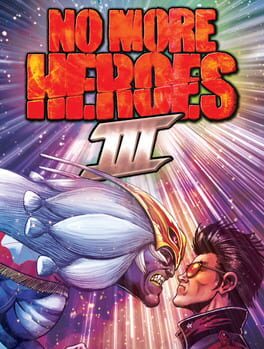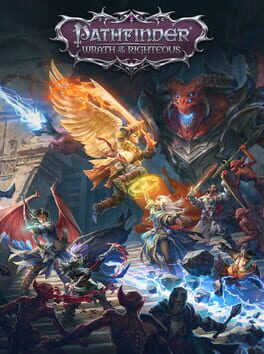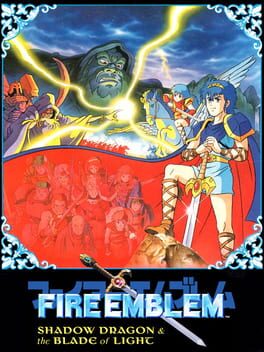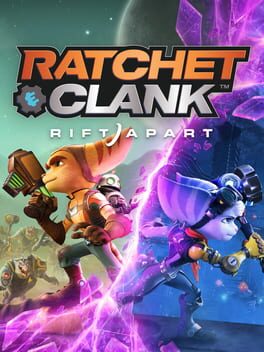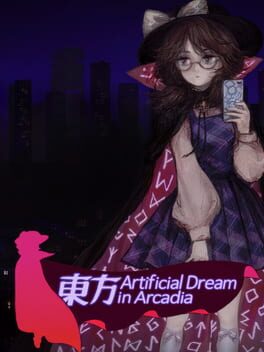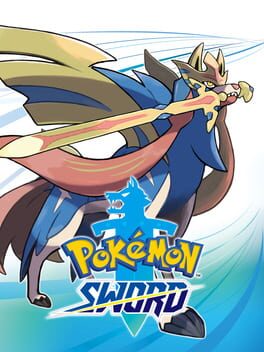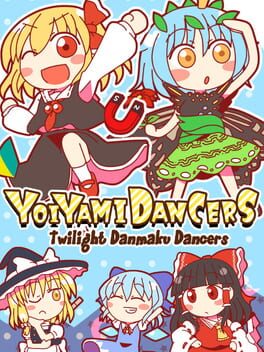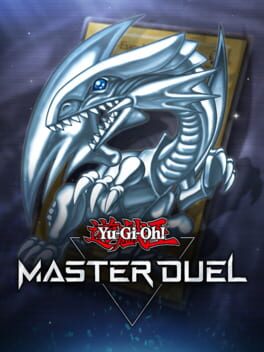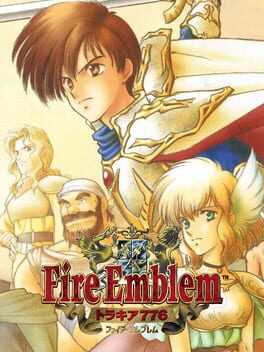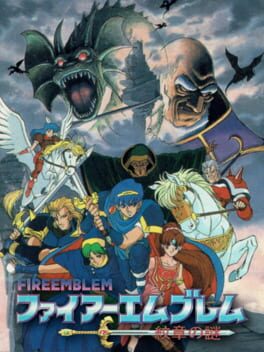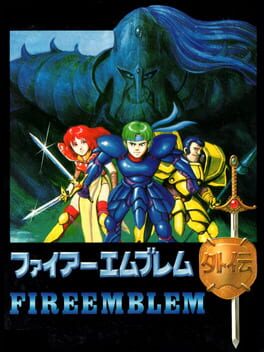Cerb
A lot better than I was expecting honestly, I love Three Houses, mostly, and despite the fanfic-y nature of this title I find myself strangely compelled to it. For reference, I've only done the Golden Wildfire route where it functions as a better Crimson Flower honestly, the deviations from the original story are well illustrated and easy to infer why Claude deviates so much compared to his Verdant Wind actions, and better yet, people are actually willing to call Claude out on his actions when he does some pretty terrible things, something no-one ever did with Edelgard in Crimson Flower. I will say that the new protagonist, Shez, is pretty flat and their storyline ultimately ends up as an optional footnote in the overall story at large which is pretty jarring, and very strange how barely anyone acknowledges it happened.
Gameplay wise, this is the only Musou to date I haven't bounced off of, it's really fun to be strategic while slapping buttons with some really satisfying movesets, shout-out to Shez's Asura and Byleth's Enlightened One movesets for being the most fun. The territories between missions can get pretty repetitive, but they take like less than 5 minutes once you know what you're doing so I didn't feel all too fatigued by the game until the last chapter, and character and class progression manages to be really satisfying with movesets that change as you advance down your desired true.
Three Hopes functions actually pretty well as a lite version of Three Houses in this regard, the main story isn't as good as most Three Houses routes but it's not bad in it's own right either, the gameplay and class progression is also a small version of Three Houses class progression but manages to capture the same feeling of satisfaction and character growth. The supports exist, and they're pretty good too, although not as good as Three Houses, again. All the redesigns and music is pretty good too. The one thing I'd say is straight up better are Shez and Byleth, with Byleth getting a pretty good set of supports, fun gameplay, and a personality a million times more entertaining than when they were silent. Shez might be pretty cardboard, but at least they're still more interesting than 3 Houses Byleth too. In the end, a game worth your time if you like Three Houses.
Gameplay wise, this is the only Musou to date I haven't bounced off of, it's really fun to be strategic while slapping buttons with some really satisfying movesets, shout-out to Shez's Asura and Byleth's Enlightened One movesets for being the most fun. The territories between missions can get pretty repetitive, but they take like less than 5 minutes once you know what you're doing so I didn't feel all too fatigued by the game until the last chapter, and character and class progression manages to be really satisfying with movesets that change as you advance down your desired true.
Three Hopes functions actually pretty well as a lite version of Three Houses in this regard, the main story isn't as good as most Three Houses routes but it's not bad in it's own right either, the gameplay and class progression is also a small version of Three Houses class progression but manages to capture the same feeling of satisfaction and character growth. The supports exist, and they're pretty good too, although not as good as Three Houses, again. All the redesigns and music is pretty good too. The one thing I'd say is straight up better are Shez and Byleth, with Byleth getting a pretty good set of supports, fun gameplay, and a personality a million times more entertaining than when they were silent. Shez might be pretty cardboard, but at least they're still more interesting than 3 Houses Byleth too. In the end, a game worth your time if you like Three Houses.
2021
In many ways Kingmaker was the modern Baldur's Gate, a faithful, ambitious, and rough implementation of tabletop roleplaying into a video game setting. Wrath of the Righteous is the modern Baldur's Gate 2, with much sharper writing, many gameplay tweaks, and an amazing reactive plot that weighs every decision and path you take meaningfully, allowing for a true role playing experience.
Starting off with the negatives, I don't love the encounter design in this game, admittedly there's a high chance im not utilising the mechanics at play to their fullest with every encounter (for reference I played a slightly modified normal difficulty) but there was a high occurrence of just turning a corner and finding your frontliner suddenly getting obliterated by some jackoff throwing 8 axes at the start of battle with a high initiative. Loot is also a bit inconsistent, there's a high amount of unique great loot, but as someone that focused purely on my MC using a dueling sword I legitimately could not find one come the penultimate act, leaving them relying mostly on the fact that they are the MC to carry that weight.
This game at its present state is also buggy, unsurprising given their last game, but still I ran into many bugs including not being able to ride my giant centipede, even though it was my mount which still devastates me to think about. As of the time of this writing, I can't even see the credits since it crashes upon them triggering for me. If bugs annoy you, I do recommend waiting down the line for a more polished experience like its predecessor.
The biggest and most glaring narrative has to be the crusade portion, or more specifically the crusade battles which take the form of a Heroes of Might and Magic rip off but there's no real strategy here, its all in the numbers and it takes a decade and honestly the actual battles themselves aren't worth your time, especially come chapter 5 where the game has the audacity to reset your armies. This portion isn't all bad though, decision making with the council is even stronger than Kingmaker's iteration, where there are more people contributing to discussion and potential solutions, it feels impactful with some strong storylines running throughout each council's major discussions. I would say don't turn on the Crusade auto mode however since it bars you from something as important as creating fast travel points, I do recommend downloading the mod Combat Relief to skip the battles but still engage with Crusade mode as the auto mode bars you off from certain Mythic Paths and other such important parts. I won't lie, crusade mode does pad your playtime out, and it is a drag so let's talk the best part of the game, the companions.
The companions in this game are fantastic, the writing quality for them is very strong and they are all fleshed out well with fantastic conclusions to every companion questline I finished. Riding off the main criticism of Kingmaker, the companions here regularly interact with each other, giving a proper idea of the relationships between party members. Western RPGs are normally pretty terrible at inter-party relationships, normally opting for an orbiting around the main character which WotR does not suffer from. Companion comments on events are normally further commented on by another, resulting in a back and forth mid conversation without involving the main character while adhering to character relationships, and it adds a crazy amount of personality to everyone. Yes, CRPGs have had ambient conversations between party members before like Dragon Age, but Wrath of the Righteous conversations being interspersed between every conversation gives them much more life than most western RPGs can claim.
Owlcat Games have also outdone themselves on the adaptational front, taking a malleable set of books intended for every Dungeon Master to put their own spin on to craft an excellent narrative that takes significant creative license where they could to completely overhaul the villains to function as an excellent story in it's own right, 10 excellent stories really since every mythic path (the system that sees your player character becoming unto a god) sees significant changes in main character identity and ambition, with a significant mythic questline to follow for each path boasting a different ending, and possibly a different final boss battle too in some cases. For this playthrough I played an aeon, an arbiter of cosmic space-time law thinking I'd be some sort of time cop, where I kinda am, but also my character frequently debated within themselves about the true nature of justice, impartiality and what it truly means to be a being with that kind of power. The aeon itself boasts several different endings depending on how your character combats this question, and I have to say the one I got for achieving what my mirror reflection decided was a true judge of cosmic law was an impressively bittersweet affair with significant gravitas and emotion behind what I had to do.
Highly recommend this game to any CRPG enthusiasts, this is one that should be remembered down the line along with the greats, and an incredible follow-up to Kingmaker.
Starting off with the negatives, I don't love the encounter design in this game, admittedly there's a high chance im not utilising the mechanics at play to their fullest with every encounter (for reference I played a slightly modified normal difficulty) but there was a high occurrence of just turning a corner and finding your frontliner suddenly getting obliterated by some jackoff throwing 8 axes at the start of battle with a high initiative. Loot is also a bit inconsistent, there's a high amount of unique great loot, but as someone that focused purely on my MC using a dueling sword I legitimately could not find one come the penultimate act, leaving them relying mostly on the fact that they are the MC to carry that weight.
This game at its present state is also buggy, unsurprising given their last game, but still I ran into many bugs including not being able to ride my giant centipede, even though it was my mount which still devastates me to think about. As of the time of this writing, I can't even see the credits since it crashes upon them triggering for me. If bugs annoy you, I do recommend waiting down the line for a more polished experience like its predecessor.
The biggest and most glaring narrative has to be the crusade portion, or more specifically the crusade battles which take the form of a Heroes of Might and Magic rip off but there's no real strategy here, its all in the numbers and it takes a decade and honestly the actual battles themselves aren't worth your time, especially come chapter 5 where the game has the audacity to reset your armies. This portion isn't all bad though, decision making with the council is even stronger than Kingmaker's iteration, where there are more people contributing to discussion and potential solutions, it feels impactful with some strong storylines running throughout each council's major discussions. I would say don't turn on the Crusade auto mode however since it bars you from something as important as creating fast travel points, I do recommend downloading the mod Combat Relief to skip the battles but still engage with Crusade mode as the auto mode bars you off from certain Mythic Paths and other such important parts. I won't lie, crusade mode does pad your playtime out, and it is a drag so let's talk the best part of the game, the companions.
The companions in this game are fantastic, the writing quality for them is very strong and they are all fleshed out well with fantastic conclusions to every companion questline I finished. Riding off the main criticism of Kingmaker, the companions here regularly interact with each other, giving a proper idea of the relationships between party members. Western RPGs are normally pretty terrible at inter-party relationships, normally opting for an orbiting around the main character which WotR does not suffer from. Companion comments on events are normally further commented on by another, resulting in a back and forth mid conversation without involving the main character while adhering to character relationships, and it adds a crazy amount of personality to everyone. Yes, CRPGs have had ambient conversations between party members before like Dragon Age, but Wrath of the Righteous conversations being interspersed between every conversation gives them much more life than most western RPGs can claim.
Owlcat Games have also outdone themselves on the adaptational front, taking a malleable set of books intended for every Dungeon Master to put their own spin on to craft an excellent narrative that takes significant creative license where they could to completely overhaul the villains to function as an excellent story in it's own right, 10 excellent stories really since every mythic path (the system that sees your player character becoming unto a god) sees significant changes in main character identity and ambition, with a significant mythic questline to follow for each path boasting a different ending, and possibly a different final boss battle too in some cases. For this playthrough I played an aeon, an arbiter of cosmic space-time law thinking I'd be some sort of time cop, where I kinda am, but also my character frequently debated within themselves about the true nature of justice, impartiality and what it truly means to be a being with that kind of power. The aeon itself boasts several different endings depending on how your character combats this question, and I have to say the one I got for achieving what my mirror reflection decided was a true judge of cosmic law was an impressively bittersweet affair with significant gravitas and emotion behind what I had to do.
Highly recommend this game to any CRPG enthusiasts, this is one that should be remembered down the line along with the greats, and an incredible follow-up to Kingmaker.
When I originally played this game I thought it was a rather outdated prototype of one of my favourite series in gaming. Upon a revisit due to it's anniversary for the Switch, and during a drought in terms of series releases, I think it's important to compare this game contextually to it's peers. There's no skating around the fact that this game is just very clunky and barebones, lacking many basic QoL features one might assume a game of this genre might require. However the most important thing that this game manages to achieve is a solid foundation and a good grasp on fundamentals that blueprint the rest of the series from this game. This game has a basic understanding of how to make a map more than just a square with forest tiles littered around, which sounds really basic but if I were to compare this game to the, even future games of the genre, and games I attempted to fill the hole left by the current Fire Emblem drought, I would find that this game achieves better fundamentals than the likes of Shining, Langrisser, Brigandine, Super Robot Wars etc. in just how it recognises that a limited palette of verbs meshes well with the basic but successful map design the game employs.
The actions are simple but it still required a decent degree of strategy, the fact that there are so few actions you can take, combined with the absolutely lopsided balance of everything in the game results in a better experience than a game of it's primitive nature may suggest, its not high art in terms of SRPGS/TRPGS but it manages a decently enjoyable swords and sorcery setting, and an overlarge roster of characters with distinguishable enough characteristics to enable a mechanical attachment to them. This game is honestly worth your time if you're a fan of the series, it establishes conventions and ideas that are still felt to this day meaningfully, while still being a decent game in it's own right.
The actions are simple but it still required a decent degree of strategy, the fact that there are so few actions you can take, combined with the absolutely lopsided balance of everything in the game results in a better experience than a game of it's primitive nature may suggest, its not high art in terms of SRPGS/TRPGS but it manages a decently enjoyable swords and sorcery setting, and an overlarge roster of characters with distinguishable enough characteristics to enable a mechanical attachment to them. This game is honestly worth your time if you're a fan of the series, it establishes conventions and ideas that are still felt to this day meaningfully, while still being a decent game in it's own right.
1997
It's a Ratchet and Clank game so of course it plays well, although I do have to express disappointment with the level design and story. The level design is really basic with really easy exploratory puzzles for optional collectibles, there really isn't anything challenging to do in the game optionally. The arena is also boring, as its straight arena wave challenges with minor permutations with not much variation.
The story and writing is definitely a step down from the original trilogy, and A Crack in Time, I'm not really sure what the intention of the story really is here to begin with, it's all rather basic with not much going on for it. At first it seems like a celebration of Ratchet and Clank, but it really isn't, it ends up being just a basic underdogs against the villain story, but the villains here are pretty awful too. The main villain this time around is set up really well, and I assume the intention was that they were actually pathetic, but there really wasn't anything too threatening about them in the end anyway, even with an all powerful weapon.
It's still a good game, and a very impressive technical achievement but where's this games legacy once that technical achievement wears off? In the end, that's definitely my biggest issue with this entry, there's not much going on for it. It doesn't have the sharp writing of the original trilogy, but it doesn't have much character exploration like the future trilogy either.
The story and writing is definitely a step down from the original trilogy, and A Crack in Time, I'm not really sure what the intention of the story really is here to begin with, it's all rather basic with not much going on for it. At first it seems like a celebration of Ratchet and Clank, but it really isn't, it ends up being just a basic underdogs against the villain story, but the villains here are pretty awful too. The main villain this time around is set up really well, and I assume the intention was that they were actually pathetic, but there really wasn't anything too threatening about them in the end anyway, even with an all powerful weapon.
It's still a good game, and a very impressive technical achievement but where's this games legacy once that technical achievement wears off? In the end, that's definitely my biggest issue with this entry, there's not much going on for it. It doesn't have the sharp writing of the original trilogy, but it doesn't have much character exploration like the future trilogy either.
Really fascinating game, and a really high quality sendup of SNES Shin Megami Tensei with a Touhou flavour. I was absolutely enraptured with the first 3/4 of this game, because of how high quality and authentic the experience is to both franchises. However I do have some criticisms that compounded themselves especially in the last quarter of the game.
Principally I think the game goes on for way too long, clocking in at around 22 hours completing the base game, the whole last quarter felt like padding just because there was a desire to see every part of Touhou as a franchise represented in this game, but the connective tissue for the last few hours before the final climb up to the top of the last dungeon was tenuous at best, with no story in the actual dungeons themselves either. I understand that it would feel off if we didn't get cool locations from the deep corners of the lore represented, but given the encounter rate with no way to adjust it, and the fact that the story felt pretty much done before you're hit with this final roadblock I was growing pretty resentful, especially because of some more annoying mechanics in this last set of dungeons. I was also pretty disappointed with dungeons that used Etrian Odyssey like overworld encounters since the encounters themselves provided little reward for overcoming them, and the actual encounters were easy to overcome as well, making them kinda moot as a dungeon obstacle. I'm also not enamoured with giving rewards for completing maps when dungeons often employed one way tracks and teleport mazes, making map reward completion an absolute slog for like 2500 Yen often.
The combat is really good, being very similar to SNES SMT without Zio stun cheese, and the Sleepers manage to capture the wonderful feeling of finding new demons and progressing as you go along, although I do think that the options of being able to upgrade and level your old sleepers to bring them along for later content is a bit of a scam, the EXP curve required to bring them up to par with the tier of sleepers even 2 dungeons later is pretty steep and requires you to grind sacrifice fodder, which is a shame because I did bring a Marisa out of stubbornness to the endgame and she still felt like she was pulling far less weight than my two new frontliners I was just able to fuse.
While I don't think this game is as well put together as a Shin Megami Tensei game, it's still a fantastic game on it's own merits, let alone as a Megaten or a Touhou fangame and well worth playing for any enthusiast.
Principally I think the game goes on for way too long, clocking in at around 22 hours completing the base game, the whole last quarter felt like padding just because there was a desire to see every part of Touhou as a franchise represented in this game, but the connective tissue for the last few hours before the final climb up to the top of the last dungeon was tenuous at best, with no story in the actual dungeons themselves either. I understand that it would feel off if we didn't get cool locations from the deep corners of the lore represented, but given the encounter rate with no way to adjust it, and the fact that the story felt pretty much done before you're hit with this final roadblock I was growing pretty resentful, especially because of some more annoying mechanics in this last set of dungeons. I was also pretty disappointed with dungeons that used Etrian Odyssey like overworld encounters since the encounters themselves provided little reward for overcoming them, and the actual encounters were easy to overcome as well, making them kinda moot as a dungeon obstacle. I'm also not enamoured with giving rewards for completing maps when dungeons often employed one way tracks and teleport mazes, making map reward completion an absolute slog for like 2500 Yen often.
The combat is really good, being very similar to SNES SMT without Zio stun cheese, and the Sleepers manage to capture the wonderful feeling of finding new demons and progressing as you go along, although I do think that the options of being able to upgrade and level your old sleepers to bring them along for later content is a bit of a scam, the EXP curve required to bring them up to par with the tier of sleepers even 2 dungeons later is pretty steep and requires you to grind sacrifice fodder, which is a shame because I did bring a Marisa out of stubbornness to the endgame and she still felt like she was pulling far less weight than my two new frontliners I was just able to fuse.
While I don't think this game is as well put together as a Shin Megami Tensei game, it's still a fantastic game on it's own merits, let alone as a Megaten or a Touhou fangame and well worth playing for any enthusiast.
2019
This review includes the DLC
With all of Game Freak's cards on the table it becomes very clear that they have no clue what they want this game to be. It's very easy to say that they were lazy but that misses the point of the fundamental disconnect that Game Freak has with their audience. Disregarding the omissions compared to prior games in the series, there is no clear vision for this game. The base game touts an open world area that the developers are clearly proud of when it permeates so many aspects of marketing and gameplay with the many endeavors towards co-operative player raids and the like, but clearly the focus was misguided at best when there are so many crippling design issues that limit what they can even do with what they have.
This is no more prevalent than the game's swan song, the Crown Tundra which boasts a legendary hunt, the best open world section to date, and a new type of co-operative content, and all three of which managed to exhibit the same type of flaws as their base game. They all share the same level of mismanagement and misunderstanding of the concepts behind good co-op design of their content often times making their nature of group content a hinderance more than anything, and this kind of example is emblematic of the entire Pokemon Sword and Shield experience. Honestly, even as a casual Pokemon fan I can't even imagine recommending this game when there are so much better Pokemon experiences out there and this game won't offer you anything new.
With all of Game Freak's cards on the table it becomes very clear that they have no clue what they want this game to be. It's very easy to say that they were lazy but that misses the point of the fundamental disconnect that Game Freak has with their audience. Disregarding the omissions compared to prior games in the series, there is no clear vision for this game. The base game touts an open world area that the developers are clearly proud of when it permeates so many aspects of marketing and gameplay with the many endeavors towards co-operative player raids and the like, but clearly the focus was misguided at best when there are so many crippling design issues that limit what they can even do with what they have.
This is no more prevalent than the game's swan song, the Crown Tundra which boasts a legendary hunt, the best open world section to date, and a new type of co-operative content, and all three of which managed to exhibit the same type of flaws as their base game. They all share the same level of mismanagement and misunderstanding of the concepts behind good co-op design of their content often times making their nature of group content a hinderance more than anything, and this kind of example is emblematic of the entire Pokemon Sword and Shield experience. Honestly, even as a casual Pokemon fan I can't even imagine recommending this game when there are so much better Pokemon experiences out there and this game won't offer you anything new.
2017
An excellent combination of two pillars of what makes Touhou great; music and frantic split second decision making, with an extremely cute and appealing aesthetic, fantastic arrangements and remixes of Touhou tracks and a brilliantly satisfying to learn difficulty curve makes this one of the best Touhou fangames I've ever played.
If you're familiar with Crypt of the Necrodancer, you already have a decent baseline on what the gameplay of this is like, but kept in a player confined grid much like a Megaman Battle Network. Unlike Crypt and Megaman BN though, you're given a wealth of movement options to dodge incoming danmaku and you're absolutely forced to learn how to use these options effectively, the game quickly punishes you for not respecting diagonal directions and using the charge move to propel yourself two spaces and the feeling of exhilaration when you manage to pull off a long chain of complex on the fly decisions WHILE keeping to a beat of a banger song, AND juggling hitting enemies by being in the same row as them is a potent combination that rewards players with an equal mix of adrenaline and satisfaction.
If you're familiar with Crypt of the Necrodancer, you already have a decent baseline on what the gameplay of this is like, but kept in a player confined grid much like a Megaman Battle Network. Unlike Crypt and Megaman BN though, you're given a wealth of movement options to dodge incoming danmaku and you're absolutely forced to learn how to use these options effectively, the game quickly punishes you for not respecting diagonal directions and using the charge move to propel yourself two spaces and the feeling of exhilaration when you manage to pull off a long chain of complex on the fly decisions WHILE keeping to a beat of a banger song, AND juggling hitting enemies by being in the same row as them is a potent combination that rewards players with an equal mix of adrenaline and satisfaction.
This will be the Fire Emblem that defines almost every Fire Emblem to come up until Three Houses, or Echoes if you wanna be a bit more pedantic, and I gotta say, this is easily the least fun and most fun I've had playing through the series history, and the second time I've beaten Thracia which actually affects the experience a lot more than I expected.
Let's start with Thracia's universally agreed positive, the writing and story slaps, and follows a much more nuanced take on concepts and ideas that permeate the series, but especially expands on some of the ideas of the last game that were only hinted out by rather throwaway village dialogue. Something I really appreciated playing this series starting with Shadow Dragon is that this game actually has a lot of variances in objectives, and maps, there's a lot to do and it gives the gameplay a really fresh direction that I really wouldn't feel when I first finished this game fresh off the heels of Binding Blade. The gameplay systems all sound pretty garbage on paper but come together to make a really cohesive and beautiful whole, strangely enough and I can't tell if it's on purpose but the negatives of the individual systems correct a negative for another individual system, for example, the low stat caps make unit growth feel pretty static and removes a bit of the individuality from characters and comes off more as a reduction of characters into functions, however the new fatigue system incentivises you to constantly be using different characters where possible which the low stat caps compliment by not forcing you to play catch up with vastly inferior units.
But here's where the game loses me a little, I'm not too crazy about most of these characters, and while that can be applied to most games that have come prior, it certainly does not apply to Genealogy, and starting this second playthrough the literal day I finish Genealogy made it even more apparent to me, it's not that the characters themselves are the issue, but moreso their presence in the story goes back to how Mystery handled individual characters, with some improvements admittedly, but I never felt, for the most part, they were more than functional parts of my roster. Another issue I had with this game are the maps, this game contains some of the best and worst maps in the series with no in-between. The best maps filled me with adrenaline and hype that I just haven't felt in Fire Emblem since Fates Conquest, while the worst maps made me question if I even liked this game in the first place. Admittedly, this game goes SO much breezier if you're familiar with the game, mechanics, and quirks that you can only get from a second playthrough, which I think is an issue in itself, but man this game introduces Fog of War, one of the worst mechanics in the series, and it's also the worst implementation of it, if I didn't already know how bullshit this implementation was I'd certainly be tearing my hair out every time my screen would be shrouded by the unfeeling black squares of Kaga.
Thracia is a game where I think most people remember the highs, and the highs are pretty damn good, a pretty good case can be made about Thracia being one of the best SRPGs of all time, and I'd agree, but I personally am not a huge fan of this entry given what came before, and what will come after.
Let's start with Thracia's universally agreed positive, the writing and story slaps, and follows a much more nuanced take on concepts and ideas that permeate the series, but especially expands on some of the ideas of the last game that were only hinted out by rather throwaway village dialogue. Something I really appreciated playing this series starting with Shadow Dragon is that this game actually has a lot of variances in objectives, and maps, there's a lot to do and it gives the gameplay a really fresh direction that I really wouldn't feel when I first finished this game fresh off the heels of Binding Blade. The gameplay systems all sound pretty garbage on paper but come together to make a really cohesive and beautiful whole, strangely enough and I can't tell if it's on purpose but the negatives of the individual systems correct a negative for another individual system, for example, the low stat caps make unit growth feel pretty static and removes a bit of the individuality from characters and comes off more as a reduction of characters into functions, however the new fatigue system incentivises you to constantly be using different characters where possible which the low stat caps compliment by not forcing you to play catch up with vastly inferior units.
But here's where the game loses me a little, I'm not too crazy about most of these characters, and while that can be applied to most games that have come prior, it certainly does not apply to Genealogy, and starting this second playthrough the literal day I finish Genealogy made it even more apparent to me, it's not that the characters themselves are the issue, but moreso their presence in the story goes back to how Mystery handled individual characters, with some improvements admittedly, but I never felt, for the most part, they were more than functional parts of my roster. Another issue I had with this game are the maps, this game contains some of the best and worst maps in the series with no in-between. The best maps filled me with adrenaline and hype that I just haven't felt in Fire Emblem since Fates Conquest, while the worst maps made me question if I even liked this game in the first place. Admittedly, this game goes SO much breezier if you're familiar with the game, mechanics, and quirks that you can only get from a second playthrough, which I think is an issue in itself, but man this game introduces Fog of War, one of the worst mechanics in the series, and it's also the worst implementation of it, if I didn't already know how bullshit this implementation was I'd certainly be tearing my hair out every time my screen would be shrouded by the unfeeling black squares of Kaga.
Thracia is a game where I think most people remember the highs, and the highs are pretty damn good, a pretty good case can be made about Thracia being one of the best SRPGs of all time, and I'd agree, but I personally am not a huge fan of this entry given what came before, and what will come after.
This review contains spoilers
I'm blown away by this game and how much it pays forward the legacy of the series in terms of themes and ideas while finally moving it on to the next stage, especially after the shadow of Kiryu loomed large over the series to the point where we really thought there was no way we'd have a game without him in the series, and here we are, Kiryu might show up in future games but never to the same capacity but this is the final ending we finally deserved, not the terrible way he ended off in 6 which was completely antithetical to the themes of the game it came from, while also bringing together parts of how he grew as a person ever since 1, or 0 if we want to be chronological.
Gameplay stuff out of the way first, its 7 but better in every way, Honolulu is an excellent location, and while the gameplay systems aren't perfect, at the state they're in now it's basically better than most modern/new turn based JRPG systems except Shin Megami Tensei V.
The story on this game does what 5 does in that it focuses entirely on themes and characters, the plot being rather secondary, and while I think that'll lead to this game not being super popular in the eyes of it's fanbase, for me this is exactly what I wanted out of the game. It's writing oozes with earnestness and discussions about character and themes that permeate the entire series while interrogating them in new modern contexts and fresh perspectives and ideas to illuminate the outdatedness a lot of the previous game's conclusions became as the world kept moving forward. The villain for this game probably isn't going to go down as one of the all time greats, but what a perfect foil for Kiryu, whose decision making has only led to further and further conflicts within the world of the yakuza, and meaningfully addresses how Kiryu was what wrought those conflicts and also giving him a moment of vulnerability to finally understand how his series wide search of a meaningful death has only come to hurt those around him, even if it's a fake death.
Also, this game finally fixes the flow on effects from one of the worst writing decisions in 6 and for that alone I have nothing but love and respect for this game.
Gameplay stuff out of the way first, its 7 but better in every way, Honolulu is an excellent location, and while the gameplay systems aren't perfect, at the state they're in now it's basically better than most modern/new turn based JRPG systems except Shin Megami Tensei V.
The story on this game does what 5 does in that it focuses entirely on themes and characters, the plot being rather secondary, and while I think that'll lead to this game not being super popular in the eyes of it's fanbase, for me this is exactly what I wanted out of the game. It's writing oozes with earnestness and discussions about character and themes that permeate the entire series while interrogating them in new modern contexts and fresh perspectives and ideas to illuminate the outdatedness a lot of the previous game's conclusions became as the world kept moving forward. The villain for this game probably isn't going to go down as one of the all time greats, but what a perfect foil for Kiryu, whose decision making has only led to further and further conflicts within the world of the yakuza, and meaningfully addresses how Kiryu was what wrought those conflicts and also giving him a moment of vulnerability to finally understand how his series wide search of a meaningful death has only come to hurt those around him, even if it's a fake death.
Also, this game finally fixes the flow on effects from one of the worst writing decisions in 6 and for that alone I have nothing but love and respect for this game.
This is where Fire Emblem really forms into how we know it today, an attempt at a more complex and nuanced storyline combined with swords and sorcery heroism with a large cast of characters that have more depth breathed into them than previous entries. For its time, its also impressive that it managed to pack a remake of the first game into it (although I've never finished this version of Shadow Dragon).
Mystery of the Emblem's main claim to fame is taking most of the maps from the original Shadow Dragon, adding a few more, then completely recontextualising those maps and adding new kinds of enemies and objectives. I previously mentioned that Shadow Dragon's maps are surprisingly decent, especially for its time, and Mystery of the Emblem reusing those maps keeps the overall map quality at a decent baseline. Other quality of life features from previous games include finally being able to trade items between units, and being able to physically see movement range as opposed to counting out tiles or stretching the movement arrow until it can't move anymore.
The main new addition in this entry is the dismount system, and I find myself a little wanting at this inclusion, certainly it makes mounted units more versatile, and balances them a bit more but I don't think this game leverages the system enough, especially in comparison to a certain famous future entry.
Mystery of the Emblem is notable in how it manages to round out the roots that Shadow Dragon planted to form the game series as we know it today, and viewing it through that historical lens definitely makes this iteration of Marth's Adventure a high quality and still very playable journey today.
Mystery of the Emblem's main claim to fame is taking most of the maps from the original Shadow Dragon, adding a few more, then completely recontextualising those maps and adding new kinds of enemies and objectives. I previously mentioned that Shadow Dragon's maps are surprisingly decent, especially for its time, and Mystery of the Emblem reusing those maps keeps the overall map quality at a decent baseline. Other quality of life features from previous games include finally being able to trade items between units, and being able to physically see movement range as opposed to counting out tiles or stretching the movement arrow until it can't move anymore.
The main new addition in this entry is the dismount system, and I find myself a little wanting at this inclusion, certainly it makes mounted units more versatile, and balances them a bit more but I don't think this game leverages the system enough, especially in comparison to a certain famous future entry.
Mystery of the Emblem is notable in how it manages to round out the roots that Shadow Dragon planted to form the game series as we know it today, and viewing it through that historical lens definitely makes this iteration of Marth's Adventure a high quality and still very playable journey today.
1992
One of the strangest entries in the Fire Emblem series, yet contributes so much to the series DNA for titles to come. Gaiden eschews the straightforward story of the original for an attempt (the best they could manage for a console like the Famicom) at a more nuanced plot with more moving parts, and to accomplish this they tried to revamp the entire Fire Emblem paradigm to mixed results. The way items works are ok, opting for a more RPG approach with even rare items that have rare drops from certain monsters, and even light dungeon crawling but the real crime here are the maps. Something I realised playing this back to back with the original Shadow Dragon and the Sword of Light is that the prior game was actually fairly competent at making maps that have a bit more strategy to them, despite being a dinosaur of strategy RPGs. Gaiden on the other hand, has absolutely dogshit maps and a fair share of frustration that stems from this, the saving grace is that with all the new systems (namely the changes to magic) the maps can fairly easily be abused around. This game is a strange one, but it's another worthy entry in the catalogue of this series, and from revisiting both Famicom titles I can still say that these two accomplish much more than most, if not all, SRPGs/TRPGs of their era.
2020
Paradise Killer is like, almost there, but as a mystery story I find myself wanting in the execution and structure of the mystery.
I feel like the main issue with Paradise Killer is in it's open world nature, at the very beginning you're given a million leads and the complete freedom to pursue it, while giving a good opportunity to explore the island, it doesn't work as well with any other melding of a genre to an open world as the overabundance of leads tends to lead to a very fatiguing few opening hours as you run through lists of dialogue trees, maybe a few more when accidentally stumbling upon evidence in your trials, leading to more dialogue trees than you had expected prior and having to double back to re-question suspects on what you just learned and it all feels very padded as a result, most of my time was spent running around getting collectibles, or finding vending machines because I needed the currency to find evidence, and the vending machines lead to an extremely vital tool. This is where I think the open world nature of the game betrays its pacing since it never feels like you're really getting anywhere even when you're crushing your leads because of a few main aspects.
Firstly, interrogating suspects in this game is pretty flawed, I dunno how you made going through a list of talking points tedious but it becomes so with the world design, having to walk back and forth, or even if you fast travel its still a significant amount of time spent on commute, on top of all of this though the main issue is that suspects are generally pretty unresponsive, they deflect any accusation thrown at them, even with all the evidence in the world pointing at them doing even a step in someone else's crime, or even if the suspects are friends with you all of them reject and deflect any claim you make resulting in really poor feedback about the progress of the investigation, combine this with social mechanics of all things, requiring you to periodically check in on suspects to get extra clues and dialogue that are essential to finding the whole truth causes a really janky feedback loop, something that a mystery game pretty much requires to be satisfying.
The open world format I suspect was to give way to the fact that you can commence the trial at any time and lay your case down from the minute you touch down, with complete freedom on who you want to accuse, and the Judge's support if you have the evidence for it, which is a really cool concept in theory but in execution it doesn't manage to achieve it's goals because the investigation is extremely backloaded, by the time you get the evidence that I believe will make the story produce any satisfaction you've probably solved almost every lead by that point, so you're probably gonna be doing the trial only at the end anyway unless you really want to see what happens when the guy you suspect isn't the culprit gets executed for every charge anyway.
Paradise Killer is a super stylish game, a treat for the eyes and ears, with clear inspirations to games and works that I really like but forgoes the actual mystery aspect in terms of gameplay and pacing that I'm left a bit mixed on the final experience, the game just kinda ends abruptly. It's almost there though, the real execution and details of the crime are great and it was really satisfying to figure it out ahead of time, even if I feel the characters didn't really acknowledge that I had pretty much figured out most of the answers by a certain point.
I feel like the main issue with Paradise Killer is in it's open world nature, at the very beginning you're given a million leads and the complete freedom to pursue it, while giving a good opportunity to explore the island, it doesn't work as well with any other melding of a genre to an open world as the overabundance of leads tends to lead to a very fatiguing few opening hours as you run through lists of dialogue trees, maybe a few more when accidentally stumbling upon evidence in your trials, leading to more dialogue trees than you had expected prior and having to double back to re-question suspects on what you just learned and it all feels very padded as a result, most of my time was spent running around getting collectibles, or finding vending machines because I needed the currency to find evidence, and the vending machines lead to an extremely vital tool. This is where I think the open world nature of the game betrays its pacing since it never feels like you're really getting anywhere even when you're crushing your leads because of a few main aspects.
Firstly, interrogating suspects in this game is pretty flawed, I dunno how you made going through a list of talking points tedious but it becomes so with the world design, having to walk back and forth, or even if you fast travel its still a significant amount of time spent on commute, on top of all of this though the main issue is that suspects are generally pretty unresponsive, they deflect any accusation thrown at them, even with all the evidence in the world pointing at them doing even a step in someone else's crime, or even if the suspects are friends with you all of them reject and deflect any claim you make resulting in really poor feedback about the progress of the investigation, combine this with social mechanics of all things, requiring you to periodically check in on suspects to get extra clues and dialogue that are essential to finding the whole truth causes a really janky feedback loop, something that a mystery game pretty much requires to be satisfying.
The open world format I suspect was to give way to the fact that you can commence the trial at any time and lay your case down from the minute you touch down, with complete freedom on who you want to accuse, and the Judge's support if you have the evidence for it, which is a really cool concept in theory but in execution it doesn't manage to achieve it's goals because the investigation is extremely backloaded, by the time you get the evidence that I believe will make the story produce any satisfaction you've probably solved almost every lead by that point, so you're probably gonna be doing the trial only at the end anyway unless you really want to see what happens when the guy you suspect isn't the culprit gets executed for every charge anyway.
Paradise Killer is a super stylish game, a treat for the eyes and ears, with clear inspirations to games and works that I really like but forgoes the actual mystery aspect in terms of gameplay and pacing that I'm left a bit mixed on the final experience, the game just kinda ends abruptly. It's almost there though, the real execution and details of the crime are great and it was really satisfying to figure it out ahead of time, even if I feel the characters didn't really acknowledge that I had pretty much figured out most of the answers by a certain point.
